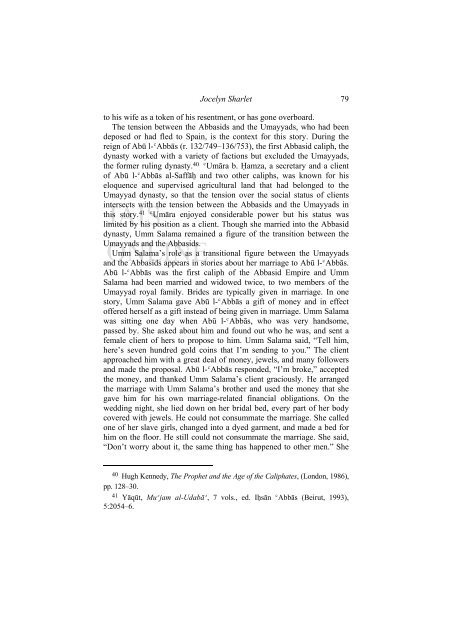JOURNAL OF ARABIC AND ISLAMIC STUDIES
JOURNAL OF ARABIC AND ISLAMIC STUDIES
JOURNAL OF ARABIC AND ISLAMIC STUDIES
Create successful ePaper yourself
Turn your PDF publications into a flip-book with our unique Google optimized e-Paper software.
JAIS<br />
ONLINE<br />
Jocelyn Sharlet<br />
to his wife as a token of his resentment, or has gone overboard.<br />
The tension between the Abbasids and the Umayyads, who had been<br />
deposed or had fled to Spain, is the context for this story. During the<br />
reign of Abū l-ʿAbbās (r. 132/749–136/753), the first Abbasid caliph, the<br />
dynasty worked with a variety of factions but excluded the Umayyads,<br />
the former ruling dynasty. 40 ʿUmāra b. Ḥamza, a secretary and a client<br />
of Abū l-ʿAbbās al-Saffāḥ and two other caliphs, was known for his<br />
eloquence and supervised agricultural land that had belonged to the<br />
Umayyad dynasty, so that the tension over the social status of clients<br />
intersects with the tension between the Abbasids and the Umayyads in<br />
this story. 41 ʿUmāra enjoyed considerable power but his status was<br />
limited by his position as a client. Though she married into the Abbasid<br />
dynasty, Umm Salama remained a figure of the transition between the<br />
Umayyads and the Abbasids.<br />
Umm Salama’s role as a transitional figure between the Umayyads<br />
and the Abbasids appears in stories about her marriage to Abū l-ʿAbbās.<br />
Abū l-ʿAbbās was the first caliph of the Abbasid Empire and Umm<br />
Salama had been married and widowed twice, to two members of the<br />
Umayyad royal family. Brides are typically given in marriage. In one<br />
story, Umm Salama gave Abū l-ʿAbbās a gift of money and in effect<br />
offered herself as a gift instead of being given in marriage. Umm Salama<br />
was sitting one day when Abū l-ʿAbbās, who was very handsome,<br />
passed by. She asked about him and found out who he was, and sent a<br />
female client of hers to propose to him. Umm Salama said, “Tell him,<br />
here’s seven hundred gold coins that I’m sending to you.” The client<br />
approached him with a great deal of money, jewels, and many followers<br />
and made the proposal. Abū l-ʿAbbās responded, “I’m broke,” accepted<br />
the money, and thanked Umm Salama’s client graciously. He arranged<br />
the marriage with Umm Salama’s brother and used the money that she<br />
gave him for his own marriage-related financial obligations. On the<br />
wedding night, she lied down on her bridal bed, every part of her body<br />
covered with jewels. He could not consummate the marriage. She called<br />
one of her slave girls, changed into a dyed garment, and made a bed for<br />
him on the floor. He still could not consummate the marriage. She said,<br />
“Don’t worry about it, the same thing has happened to other men.” She<br />
40 Hugh Kennedy, The Prophet and the Age of the Caliphates, (London, 1986),<br />
pp. 128–30.<br />
41 Yāqūt, Muʿjam al-Udabāʾ, 7 vols., ed. Iḥsān ʿAbbās (Beirut, 1993),<br />
5:2054–6.<br />
79

















